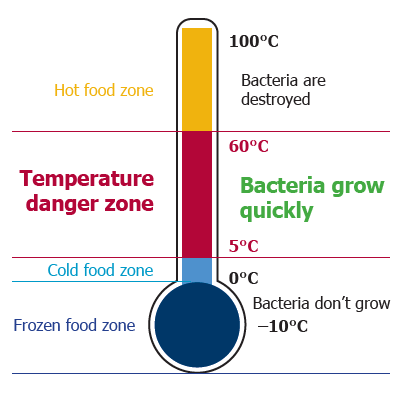To ensure food safety and public health within our local government area Council’s Food and Health Officer conducts routine inspections, assists businesses with setting up and responds to complaints from the public. Compliance is checked with the Food Act 2003, the Food Regulation 2015 and the Food Standards Code.
While there is only a requirement for one person in the business to have completed the Food Safety Supervisor Course, there is a requirement for all food handlers to have adequate skills and knowledge.
You can view a short video that highlights the key elements for ensuring food safety on the NSW Food Authority website.
Temperature control
It is important that businesses are maintaining foods at the correct temperatures to ensure their safety. This means ensuring fridges are holding cold foods below 5oC and freezers are keeping foods frozen solid.
Where cooked foods are being held hot they should be kept at above 60oC until served and eaten.
When re-heating Potentially Hazardous Foods (PHF) ensure they reach a temperature above 75oC to destroy food borne pathogens.

Storage
Foods in storage must be adequately protected from pests and contamination. Using food grade sealable containers is the best way to protect foods.
Raw potentially hazardous foods such as chicken, meats and seafood should be stored on the lowest shelves or separately from cooked and other ready to eat foods.
Potentially hazardous foods in storage should also be date labelled to allow for effective stock rotation and reduce food wastage.
The NSW Food Authority has developed a factsheet with more information for food grade packaging.
Cleaning and sanitising
A food premises including its fixtures and fittings must be kept in a clean condition free of garbage, dirt, grease, food waste and other matter.
All equipment and utensils that touch food must be sanitised after washing. Everything from spoons and forks to meat slicers and mixing bowls must be washed and then sanitised. This means applying either heat (through a commercial dishwasher reaching approx. 82oC) or using a chemical solution.
Approved chemical sanitisers include:
- Chlorine based products (such as diluted bleach)
- Quaternary Ammonium based products
- Alcohol based products
- Other products may be acceptable where the product is known to be food safe and there has been adequate lab testing to show the required log reduction in common food borne pathogens.
Visit the NSW Food Authority resource page for more information on chemical sanitisers and cleaning and sanitising in general.
Hygiene
Food handlers must observe good hygiene while handling food for the business. Regular hand washing and/or glove changing is required to help ensure food safety.
Staff MUST wash hands thoroughly whenever:
- Commencing or returning to work
- Returning from the bathroom
- Finished eating, smoking or other breaks
- Handling rubbish
- Touching nose, mouth, face or hair
- Finished handling chemicals
- Handling raw then ready to eat foods
- There is the likelihood of contaminating food or food equipment and surfaces
Food handlers and service staff should not be working if they are ill and experiencing symptoms of flu/cold virus or gastro symptoms.
Pest control
Food businesses must implement all practicable measures to prevent pest entry and harbourage within the premises. This can be more challenging in older buildings or at certain times of the year, however there are some simple and budget friendly ways to eliminate pests from your premises:
- Regular and thorough cleaning – pests will enter in the search of food, emptying waste bins and cleaning daily can help to prevent pests entering.
- Protecting foods – covering and protecting foods in sealed containers will also prevent pests entering the premises and contaminating foods
- Seal holes, gaps and cracks – possible entry points for pests throughout the building should be sealed. Also inside the kitchen and storage areas in walls, ceilings and below benches etc, this will eliminate nesting areas also.
- Remove cardboard from the premises – cockroaches will often stowaway in deliveries and love to lay their eggs in the baffles of cardboard boxes.
Animals
The Food Standards Code lays out clear rules regarding the areas where live animals are prohibited from food premises. No live animals (with the exception of seafood and shellfish) are permitted in areas where food is handled.
Recent trends have seen more cafes, pubs and restaurants allowing dogs into their outdoor areas. This is permitted only when the outdoor drinking and dining areas comply with the requirements of Food Standards Code 3.2.2 – Division 6 – Part 24 (3 and 4). The outdoor area must not be enclosed (ie. has a ceiling or roof and walls or windows) and must be able to be entered without passing through an enclosed area. Full details can be found in the Food Safety Practices and General Requirements Standard.
Woollahra Municipal Council has also developed a poster for food businesses who wish to help educate dog owners on the law regarding where dogs are not permitted. It is not a requirement for food businesses to display these posters however they can be provided upon request.
Please be advised that registered assistance animals such as guide dogs are exempt from the above provisions and are permitted in any area of a premises where customers are allowed. See the NSW Food Authority factsheet or the Disability Discrimination Act 1992 for more information.
Food allergens
Allergen awareness is the responsibility of all food businesses and their staff. Providing adequate information to consumers and implementing safe food handling practices can help to ensure your customers are protected.
To find out more about your responsibilities when it comes to allergen awareness visit the NSW Food Authority page on Allergies and Intolerances.
You can also access free online training for you and your food handling/service staff at Food Allergy Aware.
You can check out Council’s Food Businesses Information Guide(PDF, 711KB) for further information.